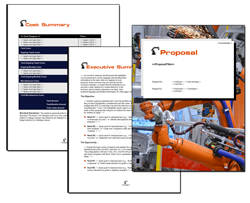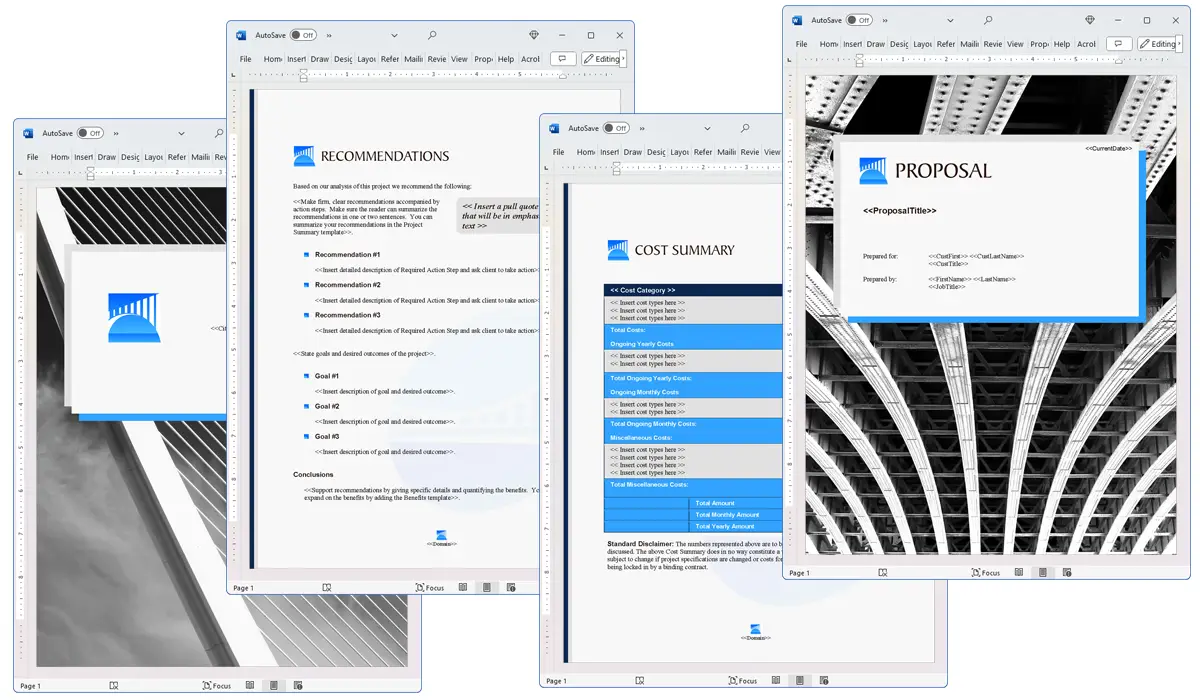What is the Fault Tolerance chapter used for?
Proposal Kit Professional Bundle adds more design themes, all six Contract Packs,
a project management library, and Expert Edition software.

Illustration of Proposal Pack Financial #4
We include this Fault Tolerance chapter template in every Proposal Pack, along with thousands more. You assemble this chapter with others in various combinations to create custom-tailored business proposals, plans, reports, and other documents. Proposal Packs apply custom visual designs to the templates, giving the final documents a consistent professional finish.
 DOWNLOADABLE, ONE-TIME COST, NO SUBSCRIPTION FEES
DOWNLOADABLE, ONE-TIME COST, NO SUBSCRIPTION FEES
Overview of the Fault Tolerance Chapter
The Fault Tolerance chapter is an important part of a business proposal document, especially when detailing systems that must operate continuously, even in the event of a partial failure. This chapter helps in outlining how a system is designed to handle potential failures-ensuring that the system remains operational without interruption. A well-written Fault Tolerance chapter reassures potential clients or investors that the proposed solution is robust and reliable, thereby increasing their confidence in the company's technical capabilities.
How is the Fault Tolerance Chapter Used?
In a business proposal, the Fault Tolerance chapter is used to describe the methods and technologies that ensure a system can continue to operate even when one or more of its components fail. It highlights the resilience of the system and its capacity to handle unexpected issues without degrading performance or losing data. This chapter is particularly important when dealing with proposals for services or products that require high availability and minimal downtime. By addressing fault tolerance, businesses can demonstrate their commitment to quality and continuous service delivery.
What is Included in the Fault Tolerance Chapter?
Typically, the Fault Tolerance chapter includes:
- Definition of Fault Tolerance: An explanation of what fault tolerance is and why it is crucial for the system being proposed.
- Architecture Overview: Describes the system's architecture and how it supports fault tolerance (e.g., redundant components, failover mechanisms).
- Technological Components: Details about the specific technologies used to achieve fault tolerance (e.g., software solutions, hardware setups).
- Testing and Performance: Information on how the fault tolerance mechanisms have been tested and how they perform under various scenarios.
- Maintenance and Monitoring: Explanation of how the system will be monitored and maintained to ensure ongoing fault tolerance.
Use Case Examples for the Fault Tolerance Chapter
- Automation Systems: Ensuring that control systems for automated production lines can switch to a backup without halting production.
- Manufacturing Facilities: Describing how critical manufacturing processes continue running even if one of the machine components fails.
- Fabrication Plants: Outlining systems that prevent shutdowns in fabric production due to equipment failure.
- Technical Systems: Explaining data redundancy in IT networks that support critical business operations.
- Problem Scenarios: Demonstrating how emergency power systems in hospitals maintain operations during a power failure.
- Negative Impact Minimization: Detailing how financial systems handle transactions without losses during a component failure.
Key Takeaways
- Important Chapter: The Fault Tolerance chapter is vital for proposals requiring high system reliability and minimal downtime.
- Client Confidence: It increases client confidence in the system's resilience and the company's technical capability.
- Detailed Explanation: Includes detailed descriptions of the architecture, technologies, testing, and maintenance plans that support fault tolerance.
- Versatile Application: Relevant across various industries like manufacturing, automation, and technical services.
- Risk Management: Highlights the proposer's proactive approaches to risk management and operational continuity.

Illustration of Proposal Pack Robotics #1
 What Our Clients Say
What Our Clients SayProposal Kit’s templates and formats helped us rework our own proposals to make them both look more professional, and make them easier to write. Definitely a must use product to streamline the proposal process."
CorpSolv Inc.
 4.7 stars, based on 845 reviews
4.7 stars, based on 845 reviewsAlternate Chapters
Related Chapters

The Fault Tolerance chapter and other chapters are integrated into a Word document as illustrated here in the Proposal Pack Infrastructure #3 design theme. There are hundreds of design themes available, and every design theme includes the Fault Tolerance chapter template.
A proper business proposal will include multiple chapters. This chapter is just one of many you can build into your proposal. We include the complete fill-in-the-blank template in our Proposal Pack template collections. We also include a library of sample proposals illustrating how companies in different industries, both large and small, have written proposals using our Proposal Packs. This template will show you how to write the Fault Tolerance.
We include a chapter library for you to build from based on your needs. All proposals are different and have different needs and goals. Pick the chapters from our collection and organize them as needed for your proposal.
Using the Proposal Pack template library, you can create any business proposal, report, study, plan, or document.
 Ian Lauder has been helping businesses write their proposals and contracts for two decades. Ian is the owner and founder of Proposal Kit, one of the original sources of business proposal and contract software products started in 1997.
Ian Lauder has been helping businesses write their proposals and contracts for two decades. Ian is the owner and founder of Proposal Kit, one of the original sources of business proposal and contract software products started in 1997.By Ian Lauder
 Published by Proposal Kit, Inc.
Published by Proposal Kit, Inc.


 Cart
Cart
 Facebook
Facebook YouTube
YouTube X
X Search Site
Search Site